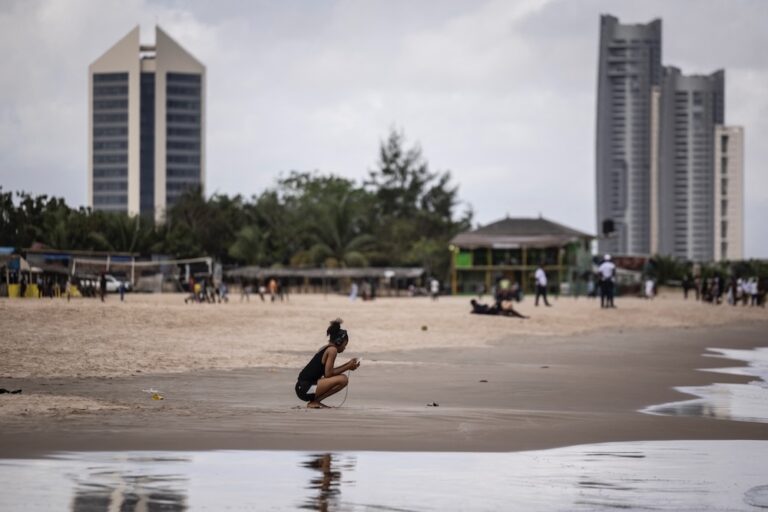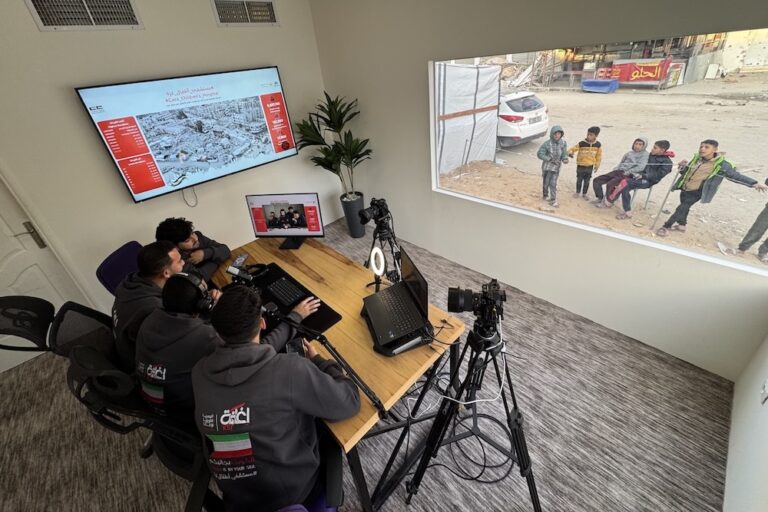(RSF/IFEX) – The following is a 28 November 2001 RSF press release: Iranian journalist REZA ALIJANI Winner of the 10th Reporters Sans Frontières – Fondation de France Prize The 2001 Reporters Sans Frontières – Fondation de France Prize has gone to journalist Reza Alijani, of the monthly Iran-é-Farda. Threatened with death on several occasions for […]
(RSF/IFEX) – The following is a 28 November 2001 RSF press release:
Iranian journalist REZA ALIJANI
Winner of the 10th Reporters Sans Frontières – Fondation de France Prize
The 2001 Reporters Sans Frontières – Fondation de France Prize has gone to journalist Reza Alijani, of the monthly Iran-é-Farda. Threatened with death on several occasions for his stance in favour of press freedom and reform, he was arrested in February 2001, ten months after his magazine was banned.
REZA ALIJANI
Reza Alijani joined Iran-e-Farda’s editorial staff in 1992 and eventually became editor-in-chief. Under his guidance, the magazine became a reference for the partisans of reform and gained great popularity among students. On a number of different occasions, Reza Alijani was summoned to appear before the revolutionary courts for his articles defending free speech. This journalist was already well known to the Iranian authorities. He was tortured and detained in the 1980s for contributing to a clandestine publication.
After the assassinations of several intellectuals in 1998, his name was high on the hit list. He is one of the rare journalists who has dared to defend freedom of the press in Iran through his interviews on foreign radios and articles in the national press. In January 1999, his actions earned him the dubious honour of receiving death threats from the fundamentalist organisation that claimed responsibility for murders committed in 1998. This did not stop Reza Alijani from speaking out. In an interview given a few months later to the daily Arya, he spoke for the first time in Iran of the murder of thousands of prisoners carried out by the authorities in 1989.
He was arrested by secret service agents in February 2001, ten months after Iran-e-Farda was banned. The journalist was held for two hundred days in isolation before being transferred in October to a cell with two other journalists. His lawyer has access neither to him nor his dossier. In nine months his wife has only been able to visit him once. 39 years old, Reza Alijani has two children.
PRESS FREEDOM IN IRAN
17 journalists in jail as of 28 November 2001
27 journalists arrested since 1 January 2001
A liberticidal press law
Over 40 publications banned since April 2000
400 cybercafés closed in May 2001
1,000 satellite dishes confiscated in October 2001
Iran holds the sad record of being the biggest prison for journalists in the Middle East. Seventeen media professionals are behind bars, most of whom have yet to be tried after months of imprisonment. After their defeat in the parliamentary elections of February 2000, the conservatives launched a major offensive against the press. On April 17, still present in Parliament, they voted for a liberty-killing law. Among other things, the law forbade a suspended newspaper from reappearing under another name and stipulated that “the persons spreading hostile propaganda to the Islamic regime are in no way authorised to be employed by a publication.” The law also said that granting a license for a publication requires “a green light from the Ministries of Information, Justice and the Pasdarans” (Guardians of the Revolution). The toll has been heavy: more than forty newspapers closed, such as Asr-e-Azadegan, Fath and Iran-e-Farda, and dozens of journalists arrested and incriminated for, among other things, “anti-Islamic propaganda”, “the spreading of false news” or “attacks on Islam”. But it takes more than attacks by conservatives and the silence of certain reformers about what is happening to discourage journalists. Supported by public opinion, they create new newspapers and continue to write.
To have freer access to information, Iranians, in particular the young, watch satellite channels or surf the Internet. But here too the regime’s hardliners have not been slow to react. In May 2001, four hundred cybercafés were closed in Tehran. In October at least 1,000 satellite dishes (theoretically banned) were seized. These measures are clearly aimed at preventing access to foreign channels, especially opposition channels based in the United States. In November, the High Council of the Cultural Revolution (headed by President Mohammad Khatami but dominated by the conservatives) decreed that all private companies offering access to the Internet must dismantle their installations or transfer their equipment to the public sector. Ali Khamenei, Guide of the Islamic Republic, is one of the world’s thirty-nine predators of press freedom exposed by Reporters Sans Frontières.
THE NOMINEES
Six other journalists were considered this year by the international jury (composed of thirty journalists and human rights activists) for the Reporters Sans Frontières – Fondation de France prize.
Sihem Bensedrine, director of the on-line newspaper Kalima and human rights activist (Tunisia);
Michèle Montas, director of Radio Haïti Inter, engaged in the fight against impunity since the murder of her husband, journalist Jean-Dominique in April 2000 (Haiti);
Geoffrey Nyarota, director of the only independent daily in Zimbabwe, The Daily News, arrested several times for his critical stances against the government (Zimbabwe);
Grigory Pasko, journalist for the daily Noveya Gazeta and Radio Free Europe (Russia) and former journalist for the Russian navy daily Boevaya Vakhta, sentenced to three years in prison in 1999 for “spreading State secrets”. Freed after twenty months of detention, he is again in danger of being sentenced by a military court;
Tipu Sultan, correspondent for the independent news agency United News of Bangladesh (UNB), seriously wounded by thugs hired by a member of parliament whose shady dealings Sultan had divulged (Bangladesh);
Qi Yanchen, independent journalist and cyber-dissident, arrested in 1999 and sentenced to four years in prison for spreading subversive information on the Internet (China).
For further information, contact Virgin


